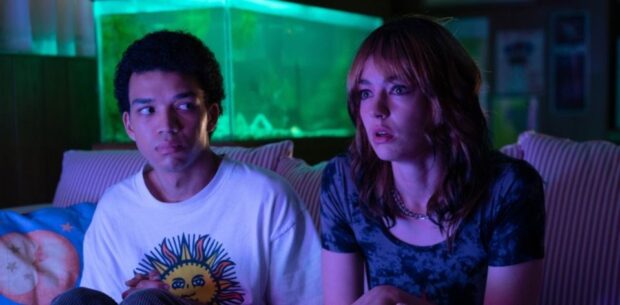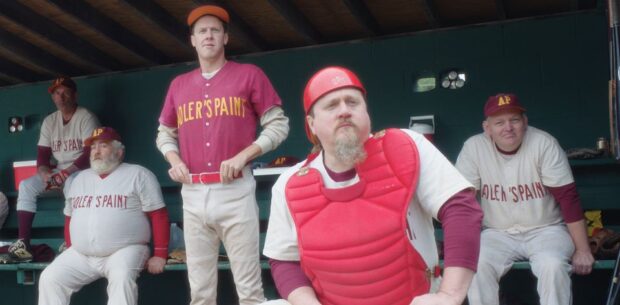The Sydney Film Festival is over for another year. Long live the Sydney Film Festival.
Like clockwork, the rain started on the opening nights of the festival. Nothing says film festival in Sydney like stepping out into the alley behind the State Theatre and trying not to slip as you dash down to the George Street cinemas.
For me, it was like rejoining an old friend. Although I go every year, it had probably been about five years since I’d ‘done the fest’ at this volume. (Indeed, looking back at my 2019 coverage on Letterboxd, I have no idea how I fit it all in). There was a moment in the first week when I’d had a long day at work and pondered whether I even wanted to be out on that wintry night. Then then lights dimmed, a wave of comfort rolled over me. I was in my happy place.
So, as the festival season rolls on, here’s a look back at all the films I saw in the 12 days of SFF. You can see all the individual coverage from the links below or by visiting this list.
Features
I Saw the TV Glow
One of the buzziest films coming out of the Sundance Film Festival this year was Jane Schoenbrun’s I SAW THE TV GLOW. Not for nothing either: their cult hit We’re All Going to the World’s Fair and a plot that speaks directly to the pop culture obsessed 90s kids seems tailor-made for festival crowds. Yet, like the characters in the film, there’s a lot more going on here than the surface description might suggest. Read the full review.
Megalopolis
Francis Ford Coppola has taken some big swings in his career, resulting in colossal misses and certified classics in unequal measure. This might be the biggest swing of them all, a collision of sound, vision and existential ideas. It doesn’t all work but it also somehow works perfectly, which may be the enigma that we’ll be unpicking long after this gnarled branch we call civilisation has withered off the tree of life. Coppola’s willingness to experiment on a scale this grand after sixty years of making films is something I continue to admire, especially in a film that combines the canvas of a blockbuster with the intimacy of live installation art. If this is his swan song then it is surely one for the greatest hits package. Read the full review.
Kinds of Kindness
Yorgos Lanthimos delivers of a triptych of his idiosyncratic weirdness, giving his little troupe of actors all the excuses they need to just play. All three stories work incredibly well on their own merits, and only the second one leans a little too close to the Twilight Zone. Jesse Plemons is the revelation here, completely disappearing into each of his three characters to the point you forget he was ever anything else. It will be really interesting to see if these twisted tales stand up to a repeat viewing. Read the full review.
Eephus
A heartfelt tribute to America’s pastime and communal experiences sure takes its sweet time — and there’s absolutely nothing wrong with that. Lund’s incredibly laidback film is in the vein of some of Richard Linklater’s work and takes a few notes out of the world of slow cinema. It is a delivery system that seems perfect for baseball. There are no major revelations or twists and turns. The pacing mimics the feeling of watching a game in full, with Lund placing his cinema audience in the bleachers and bullpen in equal measure. Read the full review.
All We Imagine As Light
The first Indian film to play in SFF’s Official Competition in thirty years may not have taken the top prize, but it’s unquestionably a winner. A meditative experience about the isolation of the city, desire and expectation versus reality. Led by a pair of phenomenal performances, especially Kani Kusruti’s award-worthy turn, this beautifully shot film that just kind of lets you bathe in it for a few hours. If there’s justice, we’ll be seeing more of this come award season. Read the full review.
Problemista
Before I go on, I need to clear the air: I’m a big user of Google Sheets. Oh no. Watching this at the Festival this year, it was immediately clear from the opening moments that the audience were the right vibe for this. Alternatively hilarious, frustrating and straight-up insightful, it’s the twin performances of Julio Torres and Tilda Swinton that glue us to the screen. An outstanding directorial debut that I would happily watch on a loop. (It’s a good thing we have a whole Torres streaming series in Fantasmas).
The Cats of Gokogu Shrine
“I love cats,” director Kazuhiro Soda told a sold out audience in Sydney. “How could I not make a film about cats?” Yes, how could he not, having lingered long on their feline forms in Oyster Factory and Inland Sea. Here he returns to the same spot, where he now lives after 27 years in New York, where he makes the kitties the stars. While Soda takes the same observational approach he usually does, it’s clear that the filmmaker and his wife/producer are very much a part of this small community. Their concerns — from cats to temples, from plants to poop — are his concerns too. Which is what makes this all the more intimate. Another winner.
The Bikeriders
Consciously name-checking The Wild One and Easy Rider along the way, Jeff Nichols crafts a world that feels lived-in and authentic while still allowing the audience to fantasise about motors and freedom and all that. Still, the reason you’re here is for those powerhouse performances. Comer is magnificent, both narrator and charismatic lightning rod for the film. Hardy does that one accent he does, but he’s damn good – it’s like he absorbs all the light around him on screen. Butler’s performance is great as well, although it’s far more obvious. Michael Shannon is terrific as always and I would happily watch a spin-off series just following Zipco telling stories. Read the full review.
Thelma
Grandmas are often our biggest cheerleaders, and few months go past without me missing mine. So, this charming as hell film cheers on a grandmother, impeccably played by nonagenarian June Squibb. This isn’t a ‘Bad Grandma’ style comedy either, instead using her innate task-oriented goodness to completely sell this often silly but genuinely heartfelt senior version of The Beekeeper.
A Different Man
This inky black comedy alternates between being tense as hell and deadpan. The real joy in this reverse body horror film is watching Sebastian Stan’s character go from being empathetic and someone to root for to the unhinged element in the room. As Renate Reinsve becomes the Second Worst Person in the World, it’s possible this film overstays its premise by 30 minutes or so. Nevertheless, Adam Pearson is just as charismatic as his character and there’s some sharp (if occasionally heavy-handed) commentary here as well.
All Shall Be Well
Ray Yeung follows Twilight’s Kiss (aka Suk Suk) with another authentic story about an older gay couple in Hong Kong. As much a spotlight on a system that needs reforming as it is an entertaining story, Patra Au Ga-Man’s powerfully understated performance is matched only by the frustrations the audience will feel at the injustices felt at every turn.
The Outrun
Built around an unquestionably stellar performance by Saoirse Ronan, this twin exploration of alcoholism and other mental health issues (especially through Stephen Dillane’s character) is a solid performance piece set against some real Orkney locations. Definitely the place I want to go when I need to write some dark poetry.
Blur: To the End
Each year, my partner and I have a tradition of watching one music documentary together at the SFF. This year, we saved it until the final night and thus To the End became my festival end. One of the better examples of the music documentary form, consciously eschewing a few of the more predictable elements, it’s an often raw and honest portrait of a group of aging rockers who are in the process of unpacking decades worth of emotional baggage. That said, for a documentary about the making of an album and a stadium concert, there’s surprisingly little music. (Even song 2, a track famous for being less than 2 minutes, doesn’t get played in full). Yet when it does kick in, you can feel the bounce of a capacity Wembley crowd singing in unison.
Sujo
Can people change their life? That’s the (eventual) central premise of this drama. At times it feels as though it is rushing through moments, while at others it slows right down to linger on them. It’s this mild unevenness that keeps this from being great for me, but it was never anything less than engaging throughout. It’s a snapshot of a life to a point, providing us with no easy answers but at the very least cracks a door open for the future.
The Hardest Line: The Story of Midnight Oil
A solid career overview that covers almost five decades in a compact period of time. Without a single talking head, save for the newer campfire footage that kicked the whole project off, this rapid collage of moments doesn’t just tell the story of a band but of a country’s political landscape from the 1970s through to today. Told in a fashion that’s consistent with the band’s oeuvre, it gets a little wobbly in the last half hour when it gallops through the late 90s and early 2000s (during Garrett’s terms in office) at a ridiculous pace. I also would have liked to see some more performance footage or songs played out in full. If nothing else, it will certainly send me back to listen to some of the albums in more detail.
Super/Man: The Christopher Reeve Story
For those of us of a certain age, there is our Superman. One of the things that I loved about this documentary was that it didn’t tell Reeve’s story in a simple linear fashion. Otherwise, we’d all simply be waiting for the critical event to come and change the course of the subject’s life. True to its title, it parallels the super and the man before and after the accident, given each part of his life equal weight in the telling. A highly emotional portrait of an actor and advocate, I have to admit to spending the last hour of this just constantly blinking back tears.
Sasquatch Sunset
Every year, there seems to be ‘that film’ on the festival circuit. It’s not the critical darling, nor is it necessarily the award winner. Yet it’s undeniably one of the films that many people wind up talking about, either because it inspired walkouts, seat squirming or uncomfortable laughter. SASQUATCH SUNSET has a little of each in equal measure. A curious film that combines stunning visuals and bold humour, but struggles with pacing, resulting in a memorable yet uneven cinematic experience. Read the full review.
In Vitro
The striking landscapes and moody near-future vibes feed this film the fuel it needs to sustain its gripping premise, although some of those twists and turns telegraph themselves a tad too early. There’s a lot to unpick in a film that veers between mystery and straight-up stalker violence, and Talia Zucker’s performance doesn’t just sustain the material but elevates it. Yet by the end of the film, it’s hard to tell whether this is a commentary on the cycle of violence against women or just another one of the stories that perpetuates it on screen.
Federer: Twelve Final Days
It’s possible that this hits a little harder if you’ve been following Federer’s career for a while. Yet the self-mythologising of the first half took a while for me to hook into, filled as it is with recording press releases, waiting for the releases to be released and watching the reactions to the release of the release. Gets quite emotional in the back half, and rightfully so, although for a capstone to the life of a tennis great it contains surprisingly little actual tennis.
Short films
Short films are sometimes the entrée that makes the main course all the tastier. (For our North American friends, entrée means appetizer in this case). Sometimes, they are standalone gems that make you want to see more from a fresh new voice.
Thanks to the free screenings in Martin Place at lunchtime, I was able to indulge my inner (and outer) animation buff and get some complimentary popcorn. The only real cost was a numb bum after sitting on stone steps for an hour in the middle of winter.
Joung Yu-mi’s CIRCLE embodied some of this idea of communal spaces with deceptively simple animation. It’s in stark contrast with the hypermodernity and self-aware style of the animation in Zofia Klamka’s SHEEP OUT, allowing the audience to ride the digital and neon woolly highway through reality. Neeraj Bhattacharjee’s RECORD. STOP. PLAY was one of my favourites, taking the simple concept of a satellite moving through space to showcase the enduring power of music (and more broadly human creativity).
Although slated for the kids’ programming, Julia Hazuka’s THE GRANDMOTHER is a phenomenally sophisticated and unique approach to animation. While the main characters of the spider and the human appear to have very simple line art, there’s a delicacy and complexity to everything else surrounding them. Similarly, CLOUD (from Christian Arredondo Narváez and Diego Alonso Sánchez de la Barquera Estrada) showcases a grainy painted texture of the clouds and backgrounds and is a really appealing visual. You can see how much attention to detail there was from the literal brushstrokes seen in the layouts.
I loved the joyful stop-motion of HOOFS ON SKATES (Ignas Meilūnas) and the 2D/3D blend of WING IT! (Rick Schutte), but BIRD DRONE (Radheya Jegatheva) is a saga of a seagull with a bung eye falling for a drone and settling on hot chips and revenge. It’s possibly the most Australian thing ever. The animation style is remarkable actually, with flattened textures mapped onto 3D models but ones that are in constant movement and flux.
























